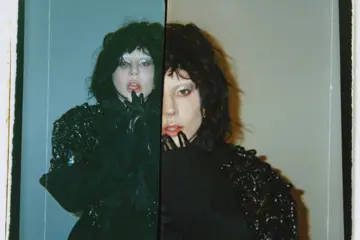 Charlie Brooker
Charlie BrookerCharlie Brooker would like to make it clear he hasn't abducted a child. The intermittent cries in the background are coming from his own young son Covey, “a very upset media consumer” unhappy that his favourite Mr Men video has come to an end. After placating his child with the latest exploits of the accident-prone Mr Bump, Brooker returns to the task at hand, slightly amazed that his offspring has already become tech-savvy at an alarmingly young age.
“He goes over to the TV and tries to swipe it like an iPad,” Brooker marvels. “He's 18-months-old and he's probably disgusted by how lo-fi the TV is. He's never going to sit still and watch something his dad made. Why would he?”
Oh, there are plenty of reasons why, primary among them the fact that Brooker is one of the more interesting, provocative voices out there in terms of the kind of humour that adds a spoonful of sugar to help the medicine go down. Brooker being Brooker though, he does tend to lace even that sugar with a dash of strychnine.
As an example, here's the multi-talented writer, columnist and broadcaster on White Bear, an episode of Black Mirror, his series of teleplays looking at society's complex and sometimes troubling relationship with technology: “It's The Truman Show meets Groundhog Day meets oh my fucking God get me out of here.”
That said, White Bear is probably among the least humourous of the Black Mirror storylines, and that's saying something when you're talking about scenarios that include a terrorist forcing the British prime minister to fuck a pig on live television. (That was the set-up of The National Anthem, the first Black Mirror episode to air.)
Still, there's a wicked cackle in Brooker's voice when he says Black Mirror is “designed to massively unsettle”. His view of the world, at least the way it exhibits itself in his work (such as his annual Screenwipe television specials or his columns for The Guardian newspaper), can combine the humorous and the harrowing. But he claims he's nowhere near as caustic or cynical as he may appear.
“When people meet me, and they know me from the 'wipe shows or The Guardian columns, they think I'm going to be this furious, massively opinionated arsehole... when really I'm just an arsehole.” He laughs. “I tend to be goofier than people expect, and probably a lot more ignorant and stupid and shallow than people expect.”
Brooker is being more than a little self-deprecating here, and viewers may agree after catching any of Black Mirror, the two seasons of which are now available on DVD. Slightly futuristic in their tone and style, each Black Mirror story explores how aspects of technology – be it social media, interactive entertainment or even just our increasing reliance on mobile phones and other such gadgets – are infiltrating our lives and changing the way we relate and react to one another. (The title, Brooker says, refers to the dark screen of a computer monitor, a television or a smartphone.)

Daniel Kaluuya and Jessica Brown Findlay [Black Mirror S1]
In episodes like Be Right Back, for example, a grieving widow finds that she is able to communicate with her late husband through an app that uses every email he ever sent, every voicemail he ever left and every social media status update he ever posted to recreate his personality. And in White Bear, a woman wakes from a coma-like state to find some kind of virus has turned ten per cent of the population into violent killers...and the other 90 per cent into mindless zombies happy to record the carnage on their camera-phones.
“There you go; there's a feel-good parable for the modern age!” chuckles Brooker. “We like to put in at least one that will drag you down to your lowest depths, and that was it this time around.”
Inspiration for the White Bear episode was drawn from a number of sources – Brooker says he was rattled by news footage of people filming the dead, desecrated body of Libyan dictator Muammar Gaddafi. Be Right Back, however, had its origins in Brooker's own reliance on Twitter and other social networks for human interaction following the birth of his son.
“You spend a lot of time up late at night, and that was my only contact with the outside world. I remember thinking 'What if this is an illusion and all these people are dead?' And that then led to this idea about software that could mimic you based on what it knew about you. It's quite an intriguing notion because the more you think about it, the more you think about whether it would be you. Because are you really you on social networking sites? I think the answer is no; I think it's a performance.”
A self-confessed “gadget geek and video-game nut”, Brooker admits his relationship with technology is “conflicted”.
“Broadly speaking, I'm pro-technology,” he admits. “It's an interesting frontier. But at the same time I'm a scaredy-cat and I sometimes worry that we're creating things we can't control. Social media, for instance, is 'an absolute miracle' in many ways, something that allows people to communicate and share important information almost instantaneously. On the other hand, you can have a situation where thousands of people tell a 13-year-old girl to kill herself because she recorded a song they didn't like. So it's the rough with the smooth. I don't know if it's made us any happier. It's made us more efficient and more informed but it's also made us more confused.”















